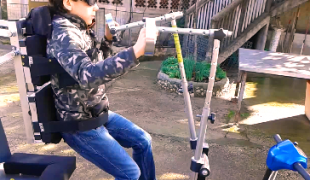- 11616
- 440
- 7
- 6
- 0
- Help Ukraine
About the solution
Like other children with Angelman's syndrome, Gonçalo was late in the acquisition of motor skills. Joaquina was aware of the disease characteristics and the knowledge that her child might not be able to get up and walk, terrified her. The first steps of a child are always too precious to lose without a fight. During a party, Joaquina observed the reaction of her child to balloons around the house, Gonçalo strove to grab them.
Hence the idea to fill her home with balloons of many colors putting them at different heights so as to encourage the child to get up to grab the balloons. The results were fantastic! The interest of Gonçalo in balloons made him try to grab them constantly and, eventually, to get up alone. With the help of this strategy, Gonçalo is now perfectly able to get up and walk without any help.
This solution shall not include mention to the use of drugs, chemicals or biologicals (including food); invasive devices; offensive, commercial or inherently dangerous content. This solution was not medically validated. Proceed with caution! If you have any doubts, please consult with a health professional.
-
-
395
-
3
-
6544

I'VE PATENTED A MACHINERY THAT ALLOWS TO PHYSYCALLY IMPAIRED TO WALK :)
WALKING WITH A WALKING AID: Walking with a walking aid
WALKING: Walking
MOVING IN A WHEELCHAIR: Moving using a wheelchair.
Muscular Dystrophy
Muscle Tone Abnormalities
Brain Injury (Abscess, Brain Barrier Defect, Brain Contusion, Brain Hemorrhage, Brain Edema)
Neuromuscular Disorders
Cerebral Palsy
Walking Aid (wheelchair/walker/crutches)
Assistive Daily Life Device (to help ADL)
Difficulty coordinating movements
Stiffness or rigidity (difficulty moving)
Paralysis of the legs and lower body
Muscle weakness
Restoring mobility
Managing Neurological Disorders
Preventing (Vaccination, Protection, Falls, Research/Mapping)
General and Family Medicine
Medical Genetics
Neurology
Orthopedics
Pediatrics
Italy
-
-
-
84
-
0
-
1500

Collaborator Pierluigi Mantovani creates Evolution Devices - solutions that aim to transform Multiple Sclerosis Management
CAREGIVING
BODY BALANCE: Maintaining body balance
STANDING UP: Standing up from a seated position
WALKING: Walking
Multiple Sclerosis
Assistive Daily Life Device (to help ADL)
Walking Aid (wheelchair/walker/crutches)
App (Including when connected with wearable)
AI algorithm
Body-Worn solutions (Clothing, accessories, shoes, sensors...)
Restoring mobility
Regaining sensory function
Managing pain
Promoting self-management
Preserving Organ Function
Managing Neurological Disorders
Maintaining Balance and Mobility
To improve Treatment/Therapy
Preventing (Vaccination, Protection, Falls, Research/Mapping)
Raise awareness
Caregiving Support
General and Family Medicine
Internal Medicine
Medical Genetics
Neurology
Physical Medicine and Rehabilitation
United States
-
-
-
144
-
0
-
2019

Hip & co- a mum's invention for hip dysplasia
CAREGIVING
BODY BALANCE: Maintaining body balance
STANDING UP: Standing up from a seated position
WALKING WITH A WALKING AID: Walking with a walking aid
WALKING: Walking
Hip Dysplasia
Assistive Daily Life Device (to help ADL)
Walking Aid (wheelchair/walker/crutches)
Difficulty walking or moving
Muscle weakness
Limited range of motion
Muscle pain or stiffness
Loss of muscle coordination
Muscle cramps or spasms
Joint deformity
Joint redness or warmth
Swelling or inflammation
Difficulty bearing weight
Numbness or tingling in the extremities
Frequent falls
Joint pain or swelling
Restoring mobility
Managing pain
Promoting self-management
Preserving Organ Function
Recovering from Traumatic Injuries
Maintaining Balance and Mobility
Raise awareness
Caregiving Support
General and Family Medicine
Orthopedics
Pediatrics
Australia
-
 en
en